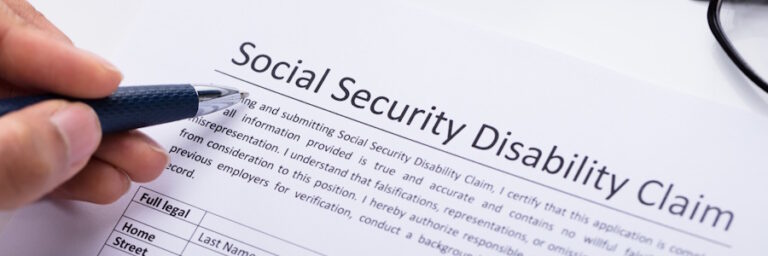
When you apply for Social Security disability benefits, the Social Security Administration (SSA) reviews your disability application to determine if you have a permanent medically determinable physical or mental impairment that prevents you from performing full-time work. When you apply for benefits, you need to provide basic information about yourself (including your name, date of birth, and Social Security number), about your work (the jobs that you have held in the last 15 years before your disability began), and about your medical condition.
Once you supply the relevant information to the SSA, they will gather medical records and review them to determine if you are disabled. This process can take anywhere from a few months to over a year. After reviewing your medical records, the Social SSA may determine that additional evaluation is needed to determine disability.
In many cases, the Social Security Administration will schedule a consultative exam with an SSA-approved doctor. The examination can be a physical exam, a mental exam, or a cognitive exam. In other instances, Social Security can schedule an X-ray, an MRI, a hearing test, or other objective exam. The exams are performed by a psychologist, physician, or psychiatrist who is contracted to perform such exams. These examiners are contractors, not employed by the Social Security Administration. The exams are intended to be conducted by an impartial examiner and results are reported back to the SSA. This exam is done at no cost to you.
What Happens During a Consultative Examination?
A consultative exam normally lasts 30–60 minutes. During a typical physical or mental examination, the examining doctor will ask for a brief medical history of your condition. It is important that you come prepared to discuss your medical condition and symptoms. When asked, be honest and avoid overestimating or underestimating your symptoms, the severity of your condition, and its effect on your daily activities.
The testing done at a consultative exam will vary depending on the specifics of your case and the type of exam that was ordered. During a physical exam, an examiner may test your range of motion, motor strength, and reflexes. During a psychiatric exam, an examiner may test your memory, concentration and attention, or your attitude and general behavior. No matter the type of exam that is performed or the tests that are done, it is important for you to cooperate as best you can and make your best efforts to complete the tests done during the exam.
After the examination, we recommend that you take notes to record your experience. Make sure to record the length of the exam, the tests you underwent, and the answers you provided to the examiner. After the examination, the results will become a part of your Social Security file. You have the right to obtain a copy of the examination.
Is It a Good Sign When SSDI Sends You to a Doctor?
An Independent Medical Opinion
The Consultative Exam is conducted by an impartial physician. The fact that a Consultative Examination was scheduled is not necessarily a good or a bad sign. It does not mean that your case will be approved or denied. The Social Security Administration often seeks an independent medical opinion to make a fair decision. Being asked to see an SSA doctor means your disability is being evaluated objectively, which can work in your favor if your condition is genuinely disabling.
Implication of a thorough review
The Social Security Administration wants to ensure that they have all of the information necessary to make a disability determination. Being sent to a consultative exam may mean that your Social Security Disability Insurance (SSDI) application is being thoroughly reviewed. This evidence will help confirm the extent of your disability and its impact on your ability to work.
The SSA is seeking additional information
The consultative examination is typically scheduled after the Social Security Administration reviews your case and determines that more information is needed to make a decision. This can occur if there are not enough medical records documenting your disability or if the SSA simply needs updated test results before making a decision. The SSA uses these examination results to confirm the extent of your disability and its impact on your ability to work.
Possible delay in decision
Please know that the fact that a consultative examination was scheduled may mean a delay in a decision. The medical examination and the subsequent processing and review of the doctor’s report may prolong the overall process. Therefore, it is very important to attend your scheduled exam to not cause any further delay.
It’s Not a Guarantee
The consultative examination is one data point that the Social Security Administration considers when determining if you are disabled. A consultative examination, even if favorable, does not necessarily mean that your case will be approved.
Consideration of additional factors
When determining disability, the Social Security Administration takes into account many factors. These important factors include your age, education, work experience, and skill set. Therefore, even if the medical report is in your favor, these factors could still influence the decision.
Possibility of case denial
The consultative examination can provide helpful evidence to demonstrate your disability and your inability to perform full-time work. But in some cases, the examination is not favorable. In the case of an unfavorable examination report, it is important to have other evidence that demonstrates your disability. This can come in the form of objective treatment records and opinion evidence from your own treating physicians.
There is always a chance of denial after being sent to a doctor by the Social Security Administration. A considerable percentage of disability claims are denied initially. If your application is denied, you have the right to appeal. You can contact LaPorte Law Firm to discuss your appeal options.
FAQs
During the Social Security disability application, you will be asked to list all of the medical providers that treat your medical conditions. While the application is pending, the Social Security Administration will contact your medical providers to obtain your medical records. These records are reviewed to determine your disability. In some cases, your doctor may be contacted to provide an opinion as to your abilities and limitations. This can be helpful evidence to evaluate and prove disability.
When the Social Security Administration schedules a consultative examination, it may mean that there is not enough evidence to prove disability. But this does not mean your claim will be denied. A consultative examination can be helpful evidence to prove disability.
The Social Security Administration is not bound by any deadlines. It can take many months to receive a decision. Typically, it takes the SSA 6–8 months to make a decision during the application stage. During the first appeal stage, it can take 4–6 months to receive a decision.
After a consultative examination is performed, it takes the examiner approximately 2–4 weeks to write the report and submit it to the SSA. The disability analyst at the SSA may take another 4–6 weeks to review the results of the report and issue a decision.














